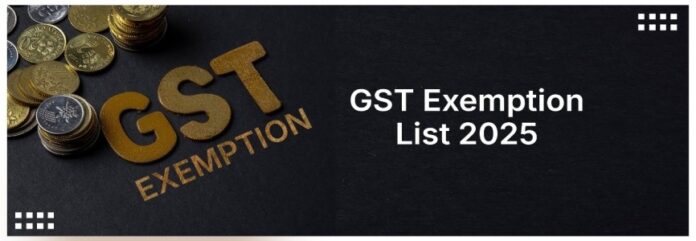As we step into 2025, the Goods and Services Tax (GST) framework continues to evolve to support economic growth, reduce the tax burden on essential services, and promote key sectors. Whether you’re a business owner, a taxpayer, or simply someone looking to stay financially informed, understanding GST exemptions is essential to stay compliant and take full advantage of tax benefits.
In this article, we’ll explore the major GST exemptions introduced or continued in 2025 that every individual and business should know.
1. Exemption on Insurance Premiums Up to ₹5 Lakh
To promote insurance coverage among the middle class and reduce the overall financial burden, insurance premiums for life and health policies up to ₹5 lakh are now exempt from GST. This change aims to make healthcare and life protection more accessible for families and individuals.
2. Gene Therapy Services Exempt from GST
In a significant step toward supporting advanced medical treatment, gene therapy services have been brought under GST exemption. This move not only reduces the cost of such cutting-edge treatments but also encourages innovation in the healthcare sector.
3. Skilling Services Provided by NSDC-Approved Training Partners
Recognizing the importance of skill development in enhancing employability, skilling and vocational training services delivered by training partners approved by the National Skill Development Corporation (NSDC) are exempt from GST. This exemption ensures affordable access to high-quality skill training across India.
4. Support Services by Electricity Utilities
Various services provided by electricity distribution companies — such as meter rentals, testing of equipment, releasing new connections, and issuing duplicate bills — are now GST-exempt. This initiative helps reduce utility bills and supports affordable access to basic infrastructure.
5. Railway Services for Public Use
Public services provided by Indian Railways, including the sale of platform tickets, cloakroom and retiring room services, and internal services within railway departments, are exempt from GST. This aims to ensure that railway-related amenities remain affordable and widely accessible.
6. Educational Services
Education remains a top priority for economic and social development. In line with this, services offered by recognized educational institutions — including pre-school to higher secondary education, and select higher education services — continue to be exempt from GST. Auxiliary services such as transportation, catering, and housekeeping when provided by these institutions are also included in the exemption.
7. Healthcare Services
Basic healthcare services provided by hospitals, clinics, and registered medical professionals are exempt from GST. This includes diagnostics, treatment, and preventive health services, ensuring that critical medical care remains affordable for the masses.
8. Charitable and Religious Services
Services provided by charitable and religious organizations — including community kitchens, public worship activities, and donations received for philanthropic causes — are not subject to GST. This exemption supports the mission of non-profits and religious bodies in delivering welfare services.
9. Agricultural Services and Products
To support farmers and promote agriculture, many goods and services in the sector remain exempt from GST. This includes fresh fruits and vegetables, seeds for sowing, agricultural implements, fertilizers, and services such as harvesting and storage. These exemptions ensure that essential food and farming supplies remain affordable.
10. Research and Development Services by Government-Funded Institutions
Research and development services funded through government grants and provided by eligible institutions are exempt from GST. This exemption is designed to foster innovation, encourage scientific advancements, and support India’s goal of becoming a knowledge-driven economy.
11. Imports by Special Economic Zones (SEZs)
Goods and services imported by SEZ units and developers for authorized operations are GST-exempt. This encourages foreign and domestic investment, promotes exports, and strengthens India’s position as a global manufacturing and service hub.
12. Residential Renting (Selective Exemption)
Renting of residential dwellings for personal use remains exempt from GST. However, commercial use or renting to businesses may still attract tax. This ensures affordability for personal housing while maintaining tax discipline for business usage.
13. Transportation of Goods by Road (Non-GTA)
Transportation of goods by road by individuals or non-GTA (Goods Transport Agency) service providers is exempt from GST. This benefits small-scale transporters and lowers overall logistics costs, especially for small and medium enterprises.
14. Public Libraries and Cultural Activities
Access to public libraries, museums, and cultural events organized by government-recognized bodies continues to be GST-exempt. This supports education, culture, and community engagement at a grassroots level.
15. Services Provided by Panchayats and Local Bodies
Basic civic services provided by local self-government bodies — such as waste collection, water supply, and street maintenance — remain GST-free. These exemptions ensure that essential public services remain accessible and affordable for residents.
Final Thoughts
The GST exemptions for 2025 have been designed to ease the financial burden on the common man, encourage economic development, and promote access to essential services. Whether you’re running a business or managing your personal finances, staying informed about these exemptions can help you make smarter financial decisions and ensure compliance with tax regulations.


